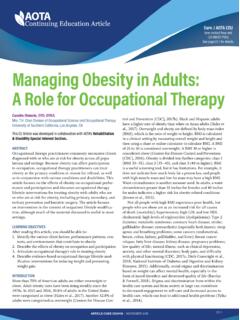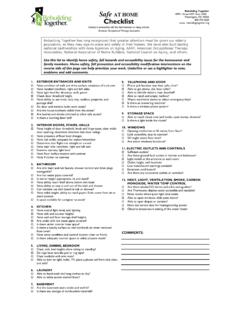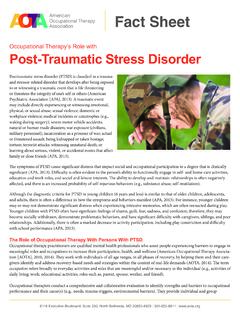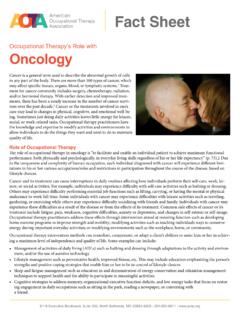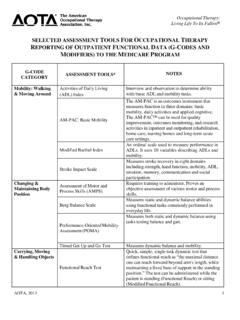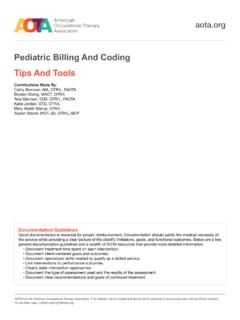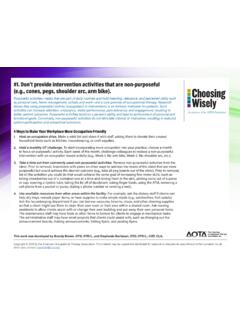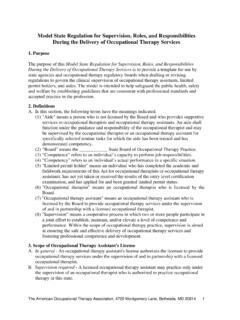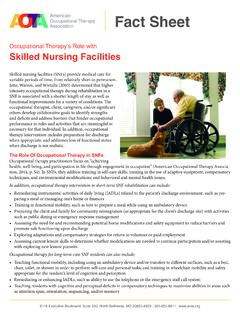Transcription of Fact Sheet - AOTA
1 A functional capacity evaluation (FCE) evaluates an individual s capacity to perform work activities related to his or her participation in employment (Soer et al., 2008). The FCE process compares the individual s health status, and body functions and structures to the demands of the job and the work environment. In essence, an FCE s primary purpose is to evaluate a person s ability to participate in work, although other instrumental activities of daily living that support work performance may also be evaluated. Similar types of testing may also be called a functional capacity assessment (FCA), physical capacity assessment or evaluation (PCA or PCE), or work capacity assessment or evaluation (WCA or WCE). A well-designed FCE should consist of a battery of standardized assessments that offers results in performance-based measures and demonstrates predictive value about the individual s return to work (Kuijer et al.)
2 , 2011; Soer, et al., 2008). Traditionally, FCEs measured an individual s ability to perform the physical demands of a job, but over the last decade many FCE batteries have begun to include evaluation of cognitive demands if such testing is warranted. The FCE must be administered with care for the client s safety and well-being. Who Can Benefit From an FCE? Someone who has been injured on the job to determine his or her ability to return to the job or alternate work Someone applying for Social Security Disability benefits Someone seeking to return to work or volunteer activities after an injury or illness Someone injured in a catastrophic accident ( , automobile accident) for whom an FCE can determine performance skills and abilities related to resuming former employment or a new job Someone seeking vocational rehabilitation services Students receiving transitional services from school to the work setting to determine their skills and the extent of support required to perform in a jobOccupational Therapy s Role in FCEs The ability to analyze an activity in detail to determine the necessary components to perform the task competently is a unique core skill of occupational therapists, based on their education and training.
3 FCEs typically require the evaluator to determine the worker s capability to perform various work-related tasks and whether there is a match between these abilities and the essential job performance components. Although individuals from other disciplines can be involved in FCEs, the occupational therapy practitioner brings unique knowledge and skills related to the complex and dynamic interactions between the person, the environment, and the FCE may be used to determine: Goals for rehabilitation or readiness for discharge planning Ability to safely return to work status (including full duty, modified duty, or transitional duty) Work ability status for vocational rehabilitation Workers compensation case settlement Disability status Ability to meet job demands as part of a hiring process (pre-work/post-offer employment testing) Ability to meet the demands of other activities ( , being a student, volunteering)Occupational Therapy s Role in functional capacity Montgomery Lane, Bethesda, MD 20814-3425 Phone: 301-652-2682 TDD: 800-377-8555 Fax.
4 301-652-7711 Fact SheetOccupational therapy enables people of all ages live life to its fullest by helping them to promote health, make lifestyle or environmental changes, and prevent or live better with injury, illness, or disability. By looking at the whole picture a client s psychological, physical, emotional, and social make-up occupational therapy assists people to achieve their goals, function at the highest possible level, maintain or rebuild their independence, and participate in the everyday activities of Are the Components of the FCE?The components of the FCE will vary based on the purpose of the assessment. The FCE typically begins with a client interview, medical record review, and musculoskeletal screening.
5 functional testing may include graded material-handling activities such as lifting, carrying, pushing, and pulling; and positional tolerance activities such as sitting, standing, walking, balancing, reaching, stooping, kneeling, crouching, crawling, object handling/manipulation, fingering, hand grasping, and hand manipulation. Pain monitoring is frequently performed during the FCE to document client-reported levels of pain during various activities as well as to manage pain. The FCE may also include evaluation of an individual s hand dexterity, hand coordination, endurance, and other job-specific functions. The FCE report includes an overall physical demand level ( Department of Labor, ), a summary of job-specific physical abilities, a summary of performance consistency and overall voluntary effort, job match information, adaptations to enhance performance, and treatment recommendations, if requested.
6 Some FCEs are designed to also report on the worker s ability to meet the cognitive demands of the job in are done on a one-on-one basis and may range in length from 4 to 6 hours. The FCE may take place over 2 consecutive days. Referral and Payment for FCEs People are generally referred for an FCE by physicians, physician assistants, and nurse practitioners; insurance representatives; case managers; employers, human resources personnel, and risk managers; attorneys (for either the plaintiff or defense); other therapists; or chiropractors. Individuals can also self-refer in states that allow direct access to occupational therapy services, but a referral may be required for reimbursement. FCEs are paid for by workers compensation insurance plans; self-insured plans; individual insurance plans; federal, state, and/or local agencies; managed care plans; individuals themselves, employers, or legal can and do change based on geography and overall evaluation time.
7 Precertification of the service and verification of the state fee schedule or reimbursement policy is occupational therapists are experts at evaluating an individual s ability to perform activities, highly skilled at analyzing work tasks, and able to measure the wide range of environmental factors that can affect work performance, they are well qualified to perform FCEs. An occupational therapy practitioner s holistic approach can enhance work performance through identification of techniques, task modifications, and environmental adaptations. ReferencesKuijer, P. P., Gouttebarge, V., Brouwer, S., Reneman, M. F., & Frings-Dresen, M. H. W. (2011). Are performance-based measures predictive of work participation in patients with musculoskeletal disorders?
8 A systematic review. International Archives of Occupational and Environmental Health, 85, 109-123. doi: Soer, R., van der Schans, C. P., Groothoff, J. W., Geertzen, J. H., & Reneman, M. F. (2008). Towards consensus in operational definitions in functional capacity evaluation : A Delphi survey. Journal of Occupational Rehabilitation, 18, 389 Department of Labor, Employment and Training Administration. ( ). Occupational Information Network (O*NET ) resource center. Retrieved from by Michael J. Gerg, MS, OTR/L, CHT, CEES, CWCE; Dave Raptosh, MA, OTR/L; Julie Dorsey, MS, OTR/L, CEAS; Faye Fick MS, OTR/L; & Vicki Kaskutas, MHS, OTD, OT/L, for the American Occupational Therapy Association. Copyright 2012 by the American Occupational Therapy Association.
9 This material may be copied and distributed for personal or educational uses without written consent. For all other uses, contact
